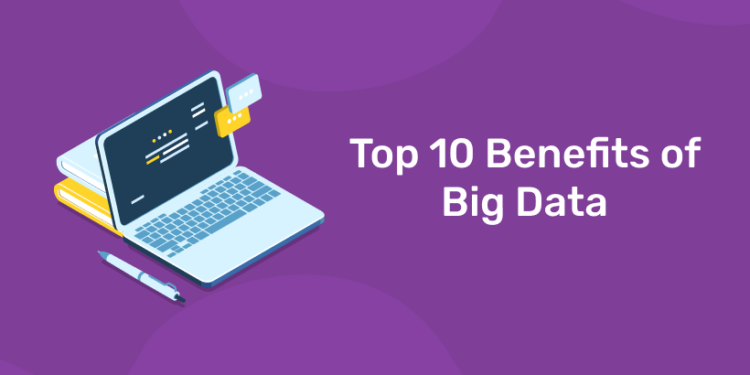Table of Contents
One way to think of big data is as a large collection of different informational sets. This knowledge is rapidly expanding. It is a large and complex data set. Although the idea of big data has been around for some time, its impact on the business world is only beginning. Read the article to know the benefits of big data.
The majority of businesses today are aware of how to use analytics to extract useful information from the terabytes of data that flow continuously into their operations. Big data and analytics are essential for any company attempting to maximize its commercial potential due to their advantages. Big data analytics presents a wide range of opportunities for experts, so think about it as your next career move.
Looking for a Data Science Career? Explore Here!
What do you mean by Big Data?
The term “big data” refers to the collection of large amounts of data with characteristics like “large variety,” “more velocity,” and “more volume,” or “3 Vs.” Structured data, unstructured data, and semi-structured data are the three main types of Big Data. The processing of this a lot of structured, semi-structured, or unstructured data aims to get valuable insights that can be used to make good business decisions in the future.
What are the Uses of Big Data?
1: Which of the following algorithms is most suitable for classification tasks?
There are many uses for big data, but these are some of the most common ones:
- Bag Data makes it possible for you to gather data about customers and their experiences, which you can then use to align properly.
- Analyzing the issues and providing potential solutions, aids in maintaining predictive failures.
- Companies can also use Big Data to test markets, roll out new plans, anticipate customer demand, and so on.
- By analyzing various indicators like unstructured data, error messages, log entries, engine temperature, and so on, Big Data is very helpful in assessing predictive failures.
- In addition, Big Data is very effective at maintaining operational functions and anticipating future customer and market demands, resulting in accurate results.
Join Our Data Science and Machine Learning Course! Enroll Here!
🚀 Start Coding Today! Enroll Now with Easy EMI Options. 💳✨
Equip yourself with in-demand skills to land top-tier roles in the data-driven world.
Start Learning Now with EMI OptionsBenefits of Big Data
-
IT Sector
- In order to modernize their dated mainframes by determining the underlying causes of failures and issues in real-time and using out-of-date code bases, numerous old IT companies rely entirely on big data. Open-source platforms like Hadoop are taking the place of traditional systems in many businesses.
- The majority of big data solutions are based on Hadoop, which enables designs to scale from a single machine to thousands of machines, each providing local computation and storage. Additionally, Hadoop is a “free” open-source platform, minimizing an organization’s capital investment in new platforms.
- Big data technologies enable IT businesses to process third-party data quickly, which is often difficult to comprehend simultaneously due to platforms’ inherent parallelization and high horsepower.
-
Business
- Information quality straightforwardly affects business process proficiency. In buy to pay process, low-quality merchant information can cause missing buy agreements or estimating data which can prompt defers in acquiring essential merchandise. Many organizations utilize huge information arrangements or calculations to just do what they have previously been doing, with the goal that there is no information misfortune also assuming we run the calculation against the informational index, the outcome may be the rundown of a person who shows credits of the deceitful way of behaving.
- To cash process, inadequate or wrong credit cutoff points or valuing data can prompt by and large client support misfortune or decrease income or may increment administration cost, with the assistance of huge information advances and the capacity to run different calculations all the more rapidly, the information can be refreshed at customary stretches over the course of the day.
- The precise examination of information or information profiling is utilized to survey the general soundness of the information which prompts legitimate business choices as per the current circumstance on the grounds that occasionally wrong information brings about mistaken administration, and that implies business choices depend on erroneous data. For instance, the more one can grasp clients’ perplexing connections, inclinations, and association history with the organization, the more pertinent and convenient business outreach.
-
Enterprise
- A company may be able to instantly repackage trillions or billions of real-time data points about its products, resources, or customers in order to improve the customer experience with big data.
- Big data technologies enable businesses to respond to customer demands more quickly and precisely because of the rapid updating of data. MetLife, for instance, used MongoDB to quickly consolidate customer data from 70 different sources and provide a single, rapidly updated view. Big data can assist businesses in acting more quickly, allowing them to adapt to changes more quickly than their rivals.
-
Other Areas
- Customers’ “buy” and “sell” decisions regarding the shares of various companies are predicted using Big Data technologies.
- In order to predict which patients are likely to seek re-admission within a few months of being discharged, hospitals are analyzing medical data and records. Patients can avoid spending money on hospital stays by going to the hospital.
- Using big data technologies, Search-Engine retrieves a large amount of data from various databases in a matter of seconds. For instance, when searching for a specific query, Google makes use of the MapReduce algorithm. MapReduce breaks down the task into manageable chunks, distributes those chunks to a large number of network-connected computers, and then aggregates the results to produce the final product.
- Monetary Administrations associations are involving huge information for information mining about client communications to cut up their clients into finely tuned sections, this will help in making progressively applicable and complex offers.
- Big Data analysis is being used by insurance companies to determine which home insurance applications can be processed immediately and which require an agent’s in-person validation.
- Information products that combine customer data are being developed by web-based businesses to provide more appealing recommendations and more successful coupon programs.
Characteristics of Big Data
The five V’s of big data characteristics are as follows:
- Volume: In and of itself, the term “big data” refers to a large volume of data. When determining the value of big data, the size of the data is very important. When working with big data solutions, one of these aspects that need to be taken into consideration is the volume of data.
- Variety: In the initial scenario, there were few data sources. Only databases and spreadsheets were to be considered. However, data from monitoring devices, PDFs, emails, videos, audio, and photos are now taken into account. These may encounter storage, data mining, and other issues.
- Value: Huge information has inherent worth. Only if this value is discovered will it be useful. It is also characterized by the significance and dependability of that data. The benefit of big data is recognizing its value. This is referred to as a discovery process because it requires business users, executives, and insightful analysts to ask the right questions, identify the pattern, and so forth.
- Velocity: The speed at which data is generated is typically referred to as velocity. The speed with which the data is generated and further processed to meet the demands must be noted. The speed at which data flows from various sources, such as mobile devices, application logs, social media sites, and so on, is known as big data velocity. The speed of big data is extremely high.
- Veracity: This indicates that the data occasionally exhibit variability and inconsistency. As a result, effective data management is lacking.
Who are the Users of Big Data?
For all businesses and industries that use big data, it has changed everything. The advantages of big data processing are utilized by nearly all businesses, no matter how big or how small. With big data, big businesses all over the world achieve enormous success.
- Big data are utilized by the Security Exchange Commission (SEC) for market activity monitoring. Panopticon Software, 1010data, and others utilize big data.
- Big data is used to provide customers with access to videos, music, and kindle books through Amazon Prime, the best option available today.
- Big data is also used to collect data from millions of users worldwide for Spotify, the music streaming service of choice.
- Big data and Google Maps are used by the University of Florida to quickly identify healthcare data.
- The United States Office of Educational Technology makes use of big data when developing analytics. Through the best Big Data courses, students may aim for careers.
- Big data is utilized by Qualcomm and Manhattan Associates for transportation-related purposes.
🚀 Start Coding Today! Enroll Now with Easy EMI Options. 💳✨
Equip yourself with in-demand skills to land top-tier roles in the data-driven world.
Start Learning Now with EMI OptionsWhy Big Data?
Big data is utilized by numerous businesses, industries, and organizations for;
- Personalized marketing campaigns
- Enhanced customer service
- Improved operations
Big data must be chosen for a number of reasons,
- The most important of which is that it enables businesses to identify patterns and trends in the business that can provide a bird’s-eye view for predicting future success.
- Additionally, industries benefit greatly from the various kinds of big data, including structured, unstructured, and semi-structured data.
Limitations of Big Data
Positive and negative effects, or dual aspects, can affect anything. Every circumstance has advantages and disadvantages. Big data is no exception. Every aspect of it is restricted.
- Security risks
- Questionable data quality
- Alack of talent
- The need for cultural change
- Compliance issues
- Hardware requirements
- Implementation costs
Conclusion
The benefits of big data and analytics demonstrate their potency for businesses of all sizes and in all sectors. Analytics professionals as well as businesses now require big data analytics. Since data is useless without the ability to interpret it, big data analysts are in high demand right now.
Big data’s advantages are well worth the effort. Big data provides the company with a significant competitive advantage. Students can achieve great career success in this field.
Join Our Data Science and Machine Learning Course! Enroll Here!
With the help of big data, you can accurately plan and forecast your business. This is an excellent platform for all kinds of resources. To complete a home-based big data course, you can enroll in one of Entri’s top Big Data certifications.
FAQs
1. What exactly is big data and what are its advantages?
Big data is the accumulation of enormous amounts of data that grows exponentially over time. A collection of extremely large data sets containing a variety of information is known as big data. This collection of data is expanding rapidly. It is a massive and intricate data set. Improvements in decision-making, fraud detection, business operations, inventions, and other areas are some of the benefits of big data.
2. What are big data’s advantages and disadvantages?
Big data’s advantages include knowledge of the market, reduced costs, increased sales, and shorter development times for new products. Constraints of big data storage, formatting, and data cleaning Quality control Accuracy, Security, and Privacy.













